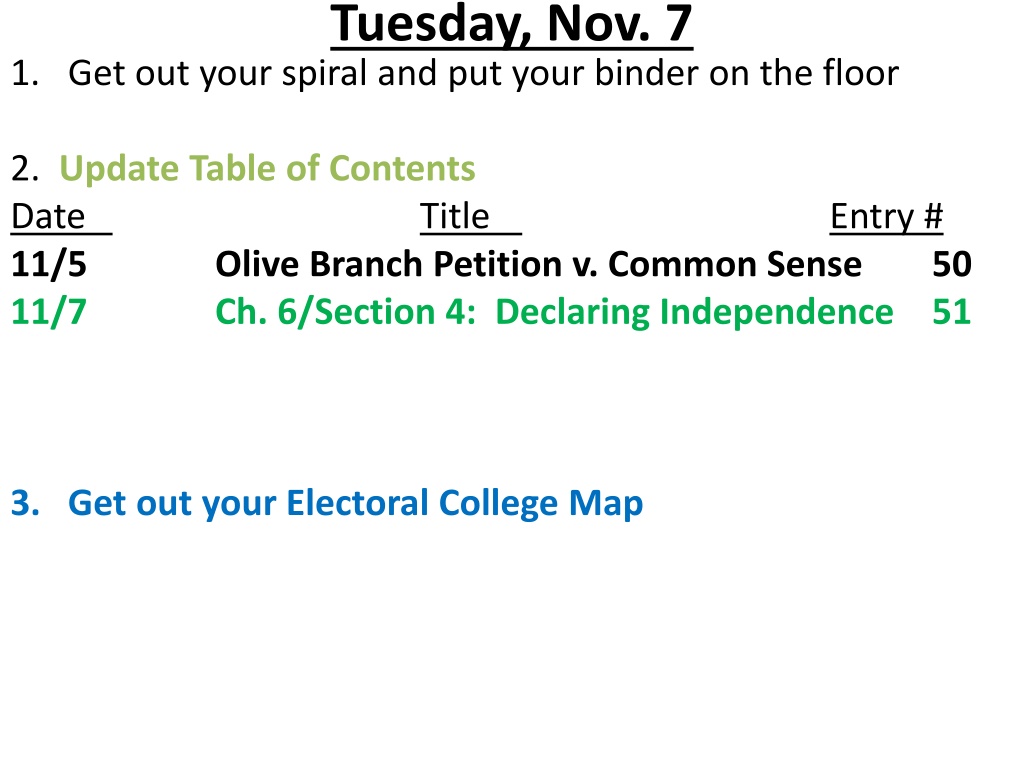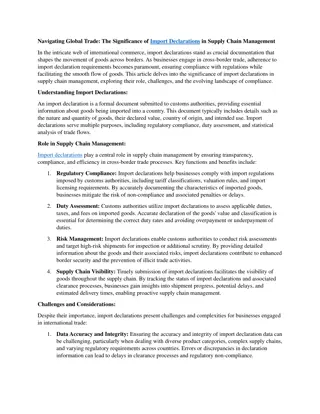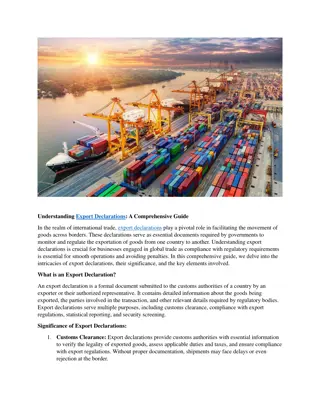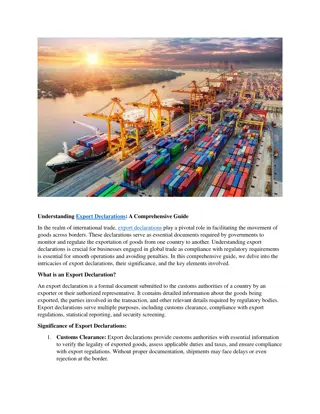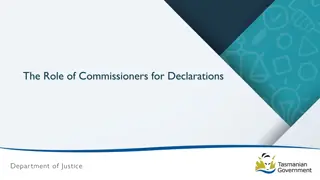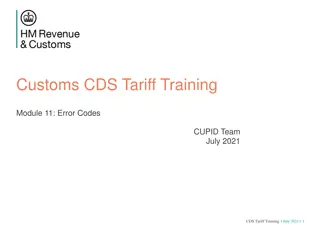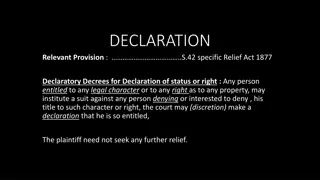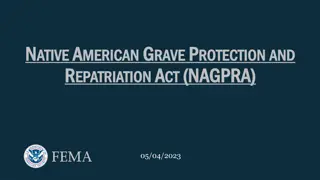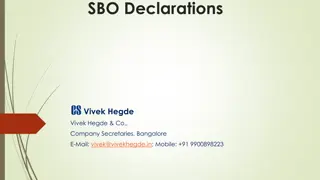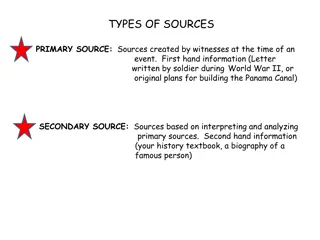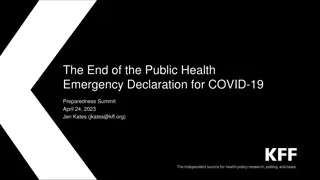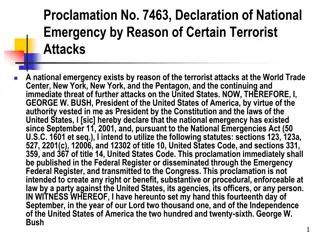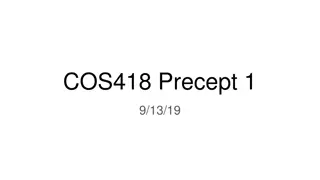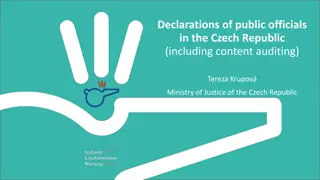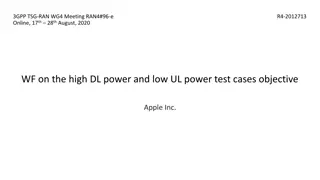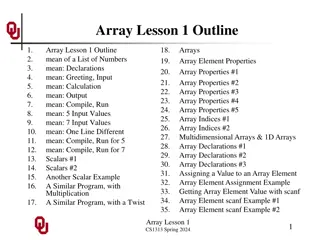Understanding American Revolutionary Documents and Declarations
Dive into the historical context of the Olive Branch Petition versus Common Sense, and explore the pivotal moments leading to the Declaration of Independence during the American Revolutionary period. Discover the political actions and outcomes shaping the Second Continental Congress and military strategies of the time.
- American Revolution
- Declaration of Independence
- Olive Branch Petition
- Common Sense
- Historical Documents
Download Presentation

Please find below an Image/Link to download the presentation.
The content on the website is provided AS IS for your information and personal use only. It may not be sold, licensed, or shared on other websites without obtaining consent from the author. Download presentation by click this link. If you encounter any issues during the download, it is possible that the publisher has removed the file from their server.
E N D
Presentation Transcript
Tuesday, Nov. 7 1. Get out your spiral and put your binder on the floor 2. Update Table of Contents Date 11/5 Olive Branch Petition v. Common Sense 11/7 Ch. 6/Section 4: Declaring Independence Title Entry # 50 51 3. Get out your Electoral College Map
Olive Branch Petition v. Common Sense Use History Alive page 110 I. After the battles at Lexington and Concord and the British retreat from back to Boston, there were many more battles, and most yet few colonists began to cry for independence. II. Make a Venn Diagram: Record at least one similarity and at least three differences between the Olive Branch Petition and Common Sense
Olive Branch Petition Common Sense Give solutions to the problems between Great Britain and the colonies.
Olive Branch Petition Common Sense * Written to King George. *Colonists ask for an end to the quarrels and hope for peace. Give solutions to the problems between Great Britain and the colonies. *King George rejects it and calls colonists traitors.
Olive Branch Petition Common Sense * Written to King George. *Written to colonists. *Colonists ask for an end to the quarrels and hope for peace. Give *Claims Great Britain has hurt the colonists. solutions to the problems between Great Britain and the colonies. *Thousands of colonists are persuaded to declare independence. *King George rejects it and calls colonists traitors.
Chapter 6/Section 4: Declaring Independence A. Categorizing Political Actions Outcomes 1. Second Continental Congress meets (May 1775) Chose George Washington as military commander Authorized printing of paper money
Chapter 6/Section 4: Declaring Independence A. Categorizing Political Actions Outcomes 1. Second Continental Congress meets (May 1775) 2. Congress drafts the Olive Branch Petition (July 1775) Military Actions Outcomes 3. Americans attack Fort Ticonderoga (May 1775) Americans captured the fort and its cannons and large guns
Chapter 6/Section 4: Declaring Independence A. Categorizing Political Actions Outcomes 1. Second Continental Congress meets (May 1775) 2. Congress drafts the Olive Branch Petition (July 1775) King George rejected the petition (blockaded entire colonies, sent German mercenaries called Hessians)
Battle of Bunker Hill http://www.youtube.com/watch?v=yaAIk6ydRwg
Chapter 6/Section 4: Declaring Independence A. Categorizing Political Actions Outcomes 1. Second Continental Congress meets (May 1775) 2. Congress drafts the Olive Branch Petition (July 1775) Military Actions Outcomes 3. Americans attack Fort Ticonderoga (May 1775) 4. Continental Army fights in the Battle of Bunker Hill (June 1775) British won but suffered huge causalities. Moral victory for the Americans
Chapter 6/Section 4: Declaring Independence A. Categorizing Political Actions Outcomes 1. Second Continental Congress meets (May 1775) 2. Congress drafts the Olive Branch Petition (July 1775) Military Actions Outcomes 3. Americans attack Fort Ticonderoga (May 1775) 4. Continental Army fights in the Battle of Bunker Hill (June 1775) 5. Continental Army invades Quebec (Nov. 1775) Continental Army was defeated
Chapter 6/Section 4: Declaring Independence A. Categorizing Political Actions Outcomes 1. Second Continental Congress meets (May 1775) 2. Congress drafts the Olive Branch Petition (July 1775) Military Actions Outcomes 3. Americans attack Fort Ticonderoga (May 1775) 4. Continental Army fights in the Battle of Bunker Hill (June 1775) 5. Continental Army invades Quebec (Nov. 1775) 6. Continental Army surrounds British forces in Boston (Jan. 1776) Continental Army s show of strength causes British soldiers and Loyalists to leave Boston
Common Sense http://www.gamequarium.org/cgi-bin/search/linfo.cgi?id=12303
Entry 55 Who: *Thomas Paine was an immigrant from England. *He was asked to write an essay urging independence Common Sense
Entry 56 Who: *Thomas Paine was an immigrant from England. *He was asked to write an essay urging independence Common Sense When: *Common Sense was written in Jan. 1776
Entry 56 Why: * Parliament didn t have the right to make laws for the colonies. *Kings are corrupt *Economically, we could survive w/out England Who: *Thomas Paine was an immigrant from England. *He was asked to write an essay urging independence Common Sense When: *Common Sense was written in Jan. 1776
Entry 56 Why: * Parliament didn t have the right to make laws for the colonies. *Kings are corrupt *Economically, we could survive w/out England Who: *Thomas Paine was an immigrant from England. *He was asked to write an essay urging independence Common Sense When: *Common Sense was written in Jan. 1776 Significance: This pamphlet sold many colonists on the idea of independence.
